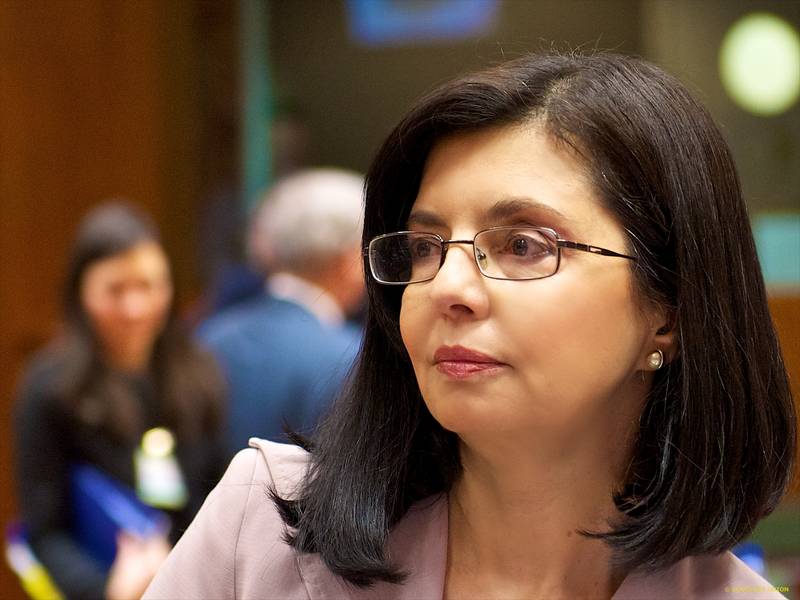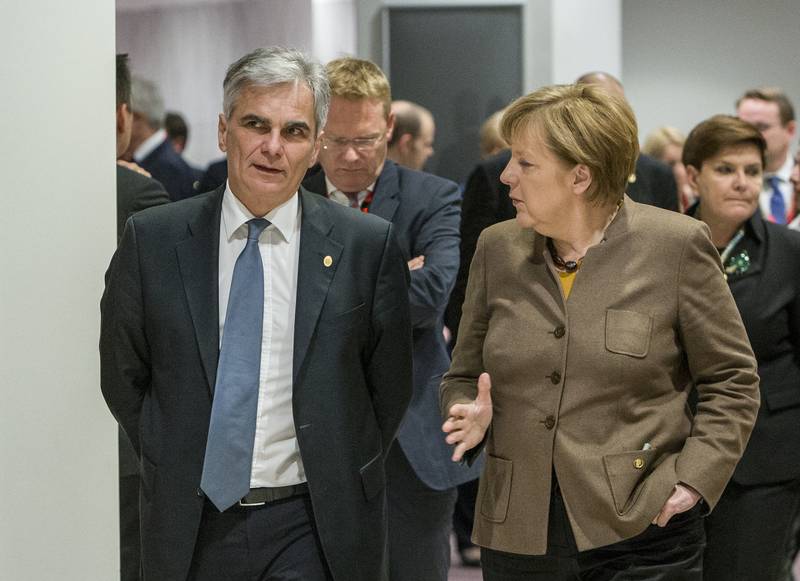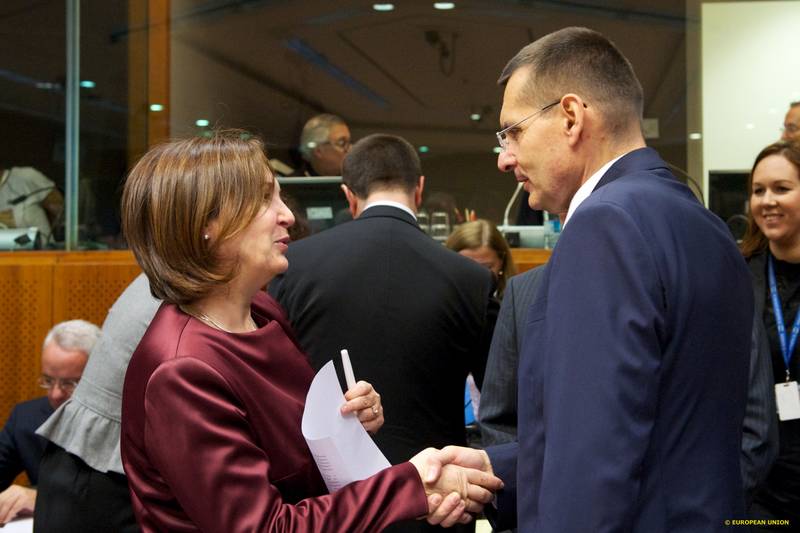The Knight of Rueful Schengen
Adelina Marini, October 15, 2015
 Whatever they tell you, be sure it is about Schengen, because Deputy Prime Minister Meglena Kuneva has embarked on a mission impossible – to raise the question of Bulgaria’s Schengen membership at every European meeting. “Bulgaria not joining Schengen eight years into its EU membership is not only our problem. This is a problem of the EU as well”, she said in front of journalists this week on the eve of the EU summit, dedicated for the fourth time in a row on the migrant-refugee crisis. Ms Kuneva even forecasted that the lack of development on Schengen dooms the European construction. To her, Schengen is a political value. The deputy PM successfully included the Schengen subject in the answer to every question that we journalists presented to her in Brussels. To her, it is extremely important that Bulgaria receives a date, regardless of whether it is this year, next year, or five years from now. Having a horizon is what is important.
Whatever they tell you, be sure it is about Schengen, because Deputy Prime Minister Meglena Kuneva has embarked on a mission impossible – to raise the question of Bulgaria’s Schengen membership at every European meeting. “Bulgaria not joining Schengen eight years into its EU membership is not only our problem. This is a problem of the EU as well”, she said in front of journalists this week on the eve of the EU summit, dedicated for the fourth time in a row on the migrant-refugee crisis. Ms Kuneva even forecasted that the lack of development on Schengen dooms the European construction. To her, Schengen is a political value. The deputy PM successfully included the Schengen subject in the answer to every question that we journalists presented to her in Brussels. To her, it is extremely important that Bulgaria receives a date, regardless of whether it is this year, next year, or five years from now. Having a horizon is what is important.
Bulgaria in no man's land
Bulgaria not being a member of the EU security zone places it in “no man’s land” – we are neither out nor in, making influencing this particular community policy very difficult. “This no man’s land, which Bulgaria and Romania are residing on, it is impossible to care for our own security and Europe’s security in this manner. We cannot spend eight years neither here nor there. We are not to contribute to Schengen’s improvement, for we do not know when we are going to join, nor are we not to do it, for we cannot belong to a different system after we have committed to this one.” The main reason for Bulgaria being out of Schengen, however, is the lack of progress in the fight against corruption and organised crime.
The Netherlands was the first country to make a clear connection between Bulgaria and Romania joining the Schengen area and their progress on the Cooperation and Verification Mechanism (CVM), whose expiration date was initially calculated at three years and it has been functioning for eight already. Unsuccessfully for Bulgaria at that. With a little more success for Romania. Following The Netherlands other states adopted this connection, regardless of the EC and EP’s assessment that Bulgaria and Romania have fulfilled all requirements for membership readiness and should be accepted. Meglena Kuneva claims that the Dutch side already tends to look at ending this connection. She says there are clear signals for a change in attitudes.
European Council President Donald Tusk, however, also made a connection between the fight against corruption and Schengen membership. And he did it in Sofia at that. During his visit to the Bulgarian capital last week he stated unequivocally: ”Finally, another word on the Schengen enlargement. I know that many in Bulgaria consider this should have happened by now. I can assure you of my support for your accession, but we need all Member States' agreement. We work hard to make it happen. In the meantime, Bulgaria needs to ensure that judicial reforms, fight against corruption and organised crime continue at a robust pace”, he said at a press conference with Prime Minister Boyko Borissov. In other words Mr Tusk admitted that there are states that are against and that this could be overcome if Bulgaria shows effective battle against corruption and a judicial reform.
Bulgaria, however, failed to push through the first truly ambitious anti-corruption bill since the establishment of the Mechanism. Despite strong pressure from Deputy PM Kuneva, the bill was rejected by Parliament in the beginning of the autumn political season. This provoked unprecedented mass reaction by the ambassadors of 14 EU member states and two non-members. “The rejection without further parliamentary discussion of the initial text proposed by the government sends a negative signal in the framework of the fight against corruption. The effective fight against corruption is a crucial element of the rule of law, and has been put on top of the agenda by the European Commission in its successive [Cooperation and Verification Mechanism] reports”, said the letter, signed by the ambassadors of The Netherlands, France, Germany, Great Britain, Austria, Belgium, Ireland, Poland, Denmark, Finland, Italy, Cyprus, Spain, and Luxembourg and supported by Switzerland and Norway.
It is quite safe to assume that these states might express reserve at the very least, if not be openly against Bulgaria joining Schengen. The issue has dropped out of the agenda of the meeting of ministers of Justice and Home Affairs earlier this month. Meglena Kuneva criticised Parliament again this week for its failure to pass the bill. According to her, three months are crucial, for it is in these three months that the battle for Bulgaria joining Schengen was being decided. Three months, in which the new budget was being prepared, on which it would depend to back the new body, to conduct trainings and appointments. If political will is not translated into action there is no will, added the deputy PM.
The EC has long ago stopped writing in Bulgaria’s progress reports that there is political will, obviously also realising that will requires actions, not just words. Meglena Kuneva stated again that she will never make a connection between the CVM and Schengen membership, but in practise she did just that in expressing hope that all [in Bulgaria] will realise how important it is that Bulgaria sends a signal that it can guarantee the border system, “including in terms of corruption”.
“When you are dealing with such sensitive matters you need to be absolutely certain that everything, connected to security, will be of such standards and such information security as in any other country”, she added and pointed out that she will again ask the prime minister to raise the question at the summit today (October 15). The subject will be present on the agenda, as is evident from the draft conclusions. A commitment to upgrade Schengen legislation is written in them. The context, however, is the guarding of EU’s outside borders. Whether PM Borissov will raise the subject is unclear. Before the start of the summit he mentioned nothing on this topic. It looks like Meglena Kuneva is last of the Mohicans in the battle against corruption and the one for Schengen membership.
Translated by Stanimir Stoev
 Werner Faymann, Angela Merkel | © Council of the EU
Werner Faymann, Angela Merkel | © Council of the EU Rumyana Bachvarova, Petre Toba | © Council of the EU
Rumyana Bachvarova, Petre Toba | © Council of the EU Meglena Kuneva | © Council of the EU
Meglena Kuneva | © Council of the EU